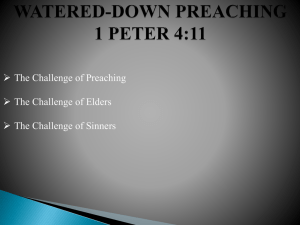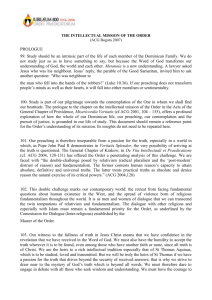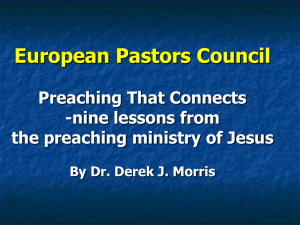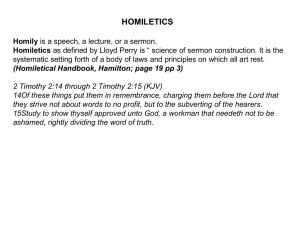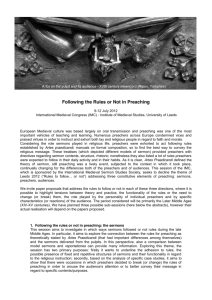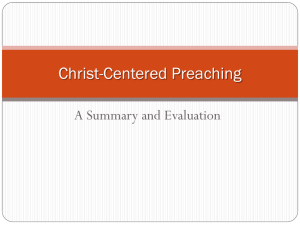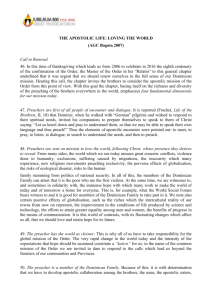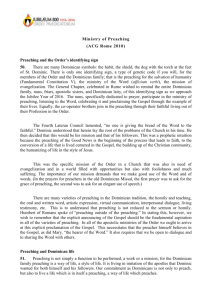Change Agents - The Good Teacher
advertisement
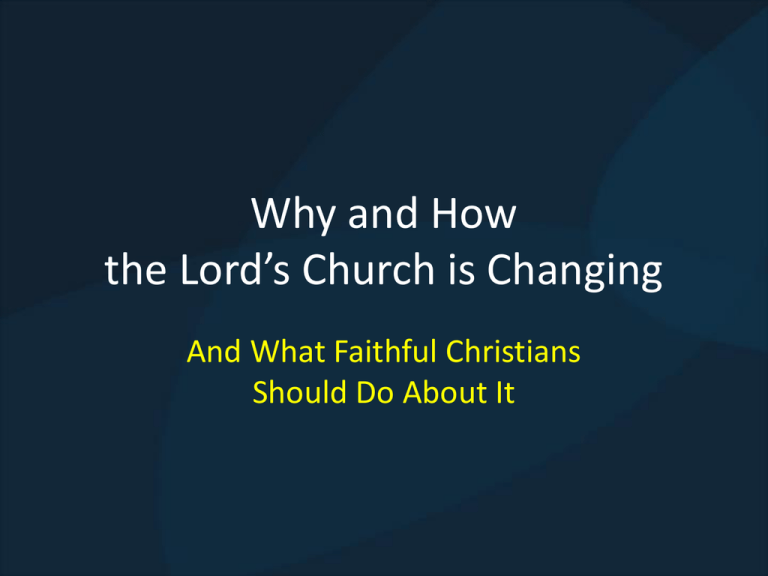
Why and How the Lord’s Church is Changing And What Faithful Christians Should Do About It Not All Change is Bad • Change from sin to salvation is not bad • Change from Judaism or paganism to Christ is not bad • Change in expediencies are not bad (technology, new hymns, etc.) • However, changing the doctrines and practices of New Testament Christians is bad (Gal. 1:6-9; 2 Jn. 9-11) “Change Agents” Among God’s People • Jeroboam was a “change agent” (1 Kings 12:25-33) • The Judaizers were “change agents” (Gal. 1:6-9) • “Change agents” existed among God’s people from 1850 to 1950: instrumental music, missionary society, institutionalism, sponsoring church, etc. • “Change agents” exist among God’s people today: baptism not necessary, instrumental music, women preachers, Lord’s supper changes, denom. fellowship Some Warnings Against Change • Acts 20:28-30 • 2 Corinthians 11:3-4,14-15 • Galatians 1:6-9; 3:3; 4:9 • 2 Thessalonians 2:7 • 1 Timothy 4:1-3 • 2 Timothy 3:1; 4:2-4 Anatomy of Change • Apostasy may be rapid, but is often gradual (Heb. 2:1) • Basic Bible doctrines are ignored (Heb. 5:12ff) • Next, false teaching comes in under the guise of truth (Mt. 7:15-20; Jude 3-4) • Finally, the Lord’s church is robbed (Col. 2:8,18); it is travelling the wrong road (Jer. 18:15) Paving the Way for Change • A “new hermeneutic” – interpretation (2 Pet. 3:16) • Current context (culture) determines what should be believed and practiced (1 Sam. 8:5,20) • Blinded hearts (Judges 16:20; 1 K. 11:4) • Vulnerability (Ezek. 3:18,20; Hos. 4:6; Acts 20:28-30) • Itching ears (2 Tim. 4:2-4) Paving the Way for Change • A lack of distinct preaching from the pulpit (2 Tim. 1:13; 2:2,15; 4:2) – Indistinct preaching contains elements of truth but remains silent on many matters crucial to our salvation – Indistinct preaching lacks the power to save, leaves people untaught, and makes the church prey to false teaching – Indistinct preaching comes from preachers who do not truly believe the gospel message Insidious Influences of Change • The culture around us (feminism, equal-rights, abortion, homosexuality, entertainment, diversity, etc.) • Books / class materials / commentaries written by liberal members of churches of Christ and denominational authors • Universities (ACU, Pepperdine), lectureships, unity meetings, websites, etc. Telltale Signs of Change • Lack of preaching showing a distinction between the Lord’s church and denominationalism (Eph. 4:4-6); lack of preaching against worldliness (Eph. 5:11) • Rapid growth due to a generalized message (no “negative preaching”) or indiscriminate acceptance of new members • “Contemporary worship” with instrumental music, praise-teams, drama, etc. Telltale Signs of Change • Appointing non-qualified elders • Inviting unsound preachers for meetings • Hiring a new and liberal preacher • Lack of Bible teaching on basic Bible doctrines • Collaborating with denominational groups Vocabulary of Change • “The leadership is seeking a change in emphasis or direction at the __________ Church of Christ” • “The __________ Church of Christ needs to get out of its comfort zone.” • “The __________ Church of Christ will never grow unless we change and move forward.” • “The __________ Church of Christ has a vision for the future.” Vocabulary of Change • “The __________ Church of Christ is progressive.” • “The __________ Church of Christ will be offering a traditional service and contemporary service.” • “I used to believe … before I discovered grace” • “I’m giving up my sectarian spirit” (listen for apologies, testimonials of change, or one seeking forgiveness for his past position) Some Current Changes • Baptism is not necessary for salvation • Instrumental music, solos, choirs, praise teams, vocal percussion (beat boxing), hand clapping, etc. • Lord’s supper on a day other than Sunday • Women leading prayers, preaching, women elders • Open fellowship with denominations Ungodly Reasons for Change • Popularity with other religious groups or the world • Conformity to the culture around us • Pride over our own wisdom and wants • Callousness toward sin and worldliness • Uninformed, unconcerned church members Questions About Change • Are we changing the actual scriptural practice / belief, or are we simply changing how the scriptural practice / belief is carried out (judgment, expediency)? • If the change is in the area of expediency, is it wise? Will it unite or divide? • What are the motives for change? What is the rationale for change? Is the reason pragmatism (because it works)? Questions About Change • Is the change prompted by an external desire, or an internal examination of scripture? • Will the change treat a symptom or the actual problem? When the change is implemented will the problem still exist? • Do we change after sound biblical examination, or simply to “go along” and “get along”? Godly Actions Toward Change • Be a student of God’s word: listen carefully, search the scriptures (Acts 17:11) • Be informed and be factual (1 Jn. 4:1) • Demand and support sound teaching and preaching from the elders, the preacher, and bible class teachers (Tit. 2:1) • Speak up and speak out against any change in scriptural practice or belief (1 Cor. 16:13; Phil. 1:17) Godly Actions Toward Change • Be loyal and willing to put God and his kingdom first in your life when the unscriptural change is implemented in the local church (Mt. 6:33) – You may have to break from family and friends (Mt. 10:34ff) – Division will test your faithfulness (1 Cor. 11:19) – Separation will show who is unfaithful (1 Jn. 2:19) What Faithful Christians Should Do • Faithful elders should be informed, guard the flock from outside errors, and refute them (Tit. 1:9) • Faithful preachers should spend their time studying and preaching the truth only (1 Tim. 4:16; 2 Tim. 2:15) • Faithful members should keep their ears open to truth and turn away from everything else; they should be solid and sound (2 Cor. 4:4; 1 Thess. 5:21; 2 Tim. 4:2-4; 2 Pet. 2:14)

